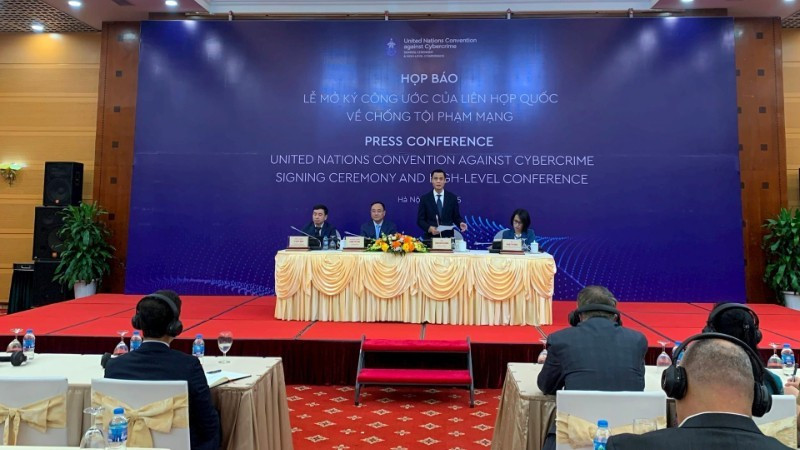This milestone marks a major achievement in multilateralism, though the path to implementing the Convention remains challenging.
An urgent necessity
Information and communication technologies play an important role in helping countries boost socio-economic development and deepen international integration. However, cyberspace also poses many potential threats to national security, sovereignty, and territorial integrity. Ensuring cybersecurity has become a common challenge for the international community, including Viet Nam.
Viet Nam ranks among the world’s leading countries in internet penetration rate, with 79.8 million users as of early 2025, equivalent to around 80% of the population.
Discussing cybercrime prevention in Viet Nam, Major General Le Xuan Minh, Director of the Department of Cybersecurity and High-Tech Crime Prevention under the Ministry of Public Security, noted that cybercrime in the country has become increasingly complex in both scale and impact. Criminal groups have shifted from small, simple attacks to well-organised operations targeting key national systems as well as businesses that play an important role in the economy.
Law enforcement agencies have taken various measures and enhanced cooperation with police and judicial bodies in other countries to jointly combat cybercrime. Yet, as cyberspace has no borders, it can only be effectively safeguarded through collective global efforts to combat cyber threats.
Viet Nam has been a steadfast supporter of the negotiation process for the United Nations Convention against Cybercrime since 2019. Deputy Minister of Foreign Affairs Dang Hoang Giang emphasised that throughout the negotiations, Viet Nam made significant contributions to key contents, including core principles such as ensuring national sovereignty in cyberspace and promoting international cooperation. Viet Nam also played an active role in coordinating, guiding discussions, and negotiating the Convention’s clauses.
The country’s efforts have received broad support and appreciation from the international community. The inclusion of the term “Ha Noi Convention” in the text of the document reflects international recognition of Viet Nam’s substantial contributions to its development.
Determined to overcome challenges
According to Major General Le Xuan Minh, as one of the countries involved in the process of building the Convention since the early days, Viet Nam hopes the Convention will soon be implemented by signatory states — and is itself committed to early ratification. A representative from the Ministry of Public Security stressed that after the signing of the Convention, Viet Nam will begin reviewing relevant laws to prepare for ratification as soon as possible.
Key measures include amending the Law on Cybersecurity and integrating it with the Law on Cyberinformation Security, and completing the legal framework on criminal procedures to enable implementation of provisions such as criminal information exchange, data transfer, extradition, and asset recovery. Viet Nam also plans to establish a round-the-clock coordination mechanism as required by the Convention, aiming to become one of the earliest countries to ratify and enforce it.
Determined to uphold its pioneering role and lead global cooperation in cybersecurity, Viet Nam faces a major opportunity to leverage international resources, particularly technical assistance, to build a safe and peaceful digital environment. The upcoming event serves as a platform for Viet Nam and other nations to share experiences and advanced technologies in combating cybercrime.
However, opportunities go hand in hand with challenges. The adoption of the Convention marks only the beginning. Effective implementation will require countries to bridge differences, find common ground, strengthen connections, and maintain goodwill in cooperation. Divergences in institutions, legal systems and human resource capacities remain barriers to global collaboration.
Sharing his thoughts on the challenges ahead, Deputy Minister of Foreign Affairs Dang Hoang Giang stressed that the decisive factor lies in human capacity. Every official and citizen must enhance their knowledge, awareness, capacity and resilience to strengthen international cooperation and share experiences in preventing both conventional and cybercrimes.
Although the path to implementing the Convention may be long and complex, drawing on its resolve and experience in previous international initiatives, Viet Nam remains determined to contribute proactively to global cooperation to combat cybercrime, a transnational challenge of the digital era.
















